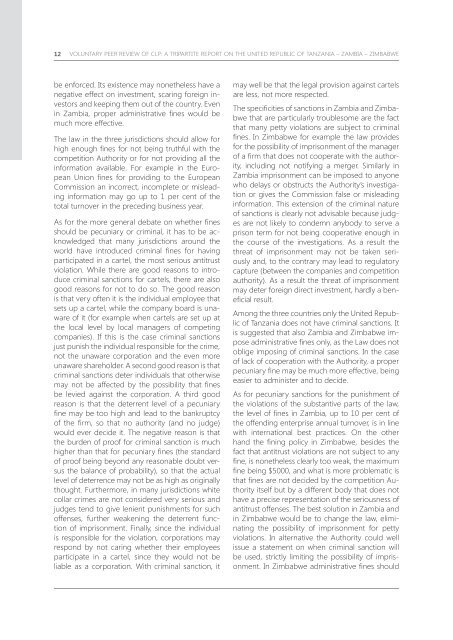a tripartite report - Unctad
a tripartite report - Unctad
a tripartite report - Unctad
Create successful ePaper yourself
Turn your PDF publications into a flip-book with our unique Google optimized e-Paper software.
12 VOLUNTARY PEER REVIEW OF CLP: A TRIPARTITE REPORT ON THE UNITED REPUBLIC OF TANZANIA – ZAMBIA – ZIMBABWE<br />
be enforced. Its existence may nonetheless have a<br />
negative effect on investment, scaring foreign investors<br />
and keeping them out of the country. Even<br />
<br />
much more effective.<br />
The law in the three jurisdictions should allow for<br />
<br />
competition Authority or for not providing all the<br />
information available. For example in the Euro-<br />
<br />
Commission an incorrect, incomplete or misleading<br />
information may go up to 1 per cent of the<br />
total turnover in the preceding business year.<br />
<br />
should be pecuniary or criminal, it has to be acknowledged<br />
that many jurisdictions around the<br />
<br />
participated in a cartel, the most serious antitrust<br />
violation. While there are good reasons to introduce<br />
criminal sanctions for cartels, there are also<br />
good reasons for not to do so. The good reason<br />
is that very often it is the individual employee that<br />
sets up a cartel, while the company board is unaware<br />
of it (for example when cartels are set up at<br />
the local level by local managers of competing<br />
companies). If this is the case criminal sanctions<br />
just punish the individual responsible for the crime,<br />
not the unaware corporation and the even more<br />
unaware shareholder. A second good reason is that<br />
criminal sanctions deter individuals that otherwise<br />
<br />
be levied against the corporation. A third good<br />
reason is that the deterrent level of a pecuniary<br />
<br />
<br />
would ever decide it. The negative reason is that<br />
the burden of proof for criminal sanction is much<br />
<br />
of proof being beyond any reasonable doubt versus<br />
the balance of probability), so that the actual<br />
level of deterrence may not be as high as originally<br />
thought. Furthermore, in many jurisdictions white<br />
collar crimes are not considered very serious and<br />
judges tend to give lenient punishments for such<br />
offenses, further weakening the deterrent function<br />
of imprisonment. Finally, since the individual<br />
is responsible for the violation, corporations may<br />
respond by not caring whether their employees<br />
participate in a cartel, since they would not be<br />
liable as a corporation. With criminal sanction, it<br />
may well be that the legal provision against cartels<br />
are less, not more respected.<br />
bwe<br />
that are particularly troublesome are the fact<br />
that many petty violations are subject to criminal<br />
<br />
for the possibility of imprisonment of the manager<br />
ity,<br />
including not notifying a merger. Similarly in<br />
Zambia imprisonment can be imposed to anyone<br />
who delays or obstructs the Authority’s investigation<br />
or gives the Commission false or misleading<br />
information. This extension of the criminal nature<br />
of sanctions is clearly not advisable because judges<br />
are not likely to condemn anybody to serve a<br />
prison term for not being cooperative enough in<br />
the course of the investigations. As a result the<br />
threat of imprisonment may not be taken seriously<br />
and, to the contrary may lead to regulatory<br />
capture (between the companies and competition<br />
authority). As a result the threat of imprisonment<br />
may deter foreign direct investment, hardly a ben-<br />
<br />
Among the three countries only the United Republic<br />
of Tanzania does not have criminal sanctions. It<br />
is suggested that also Zambia and Zimbabwe im-<br />
<br />
oblige imposing of criminal sanctions. In the case<br />
of lack of cooperation with the Authority, a proper<br />
<br />
easier to administer and to decide.<br />
As for pecuniary sanctions for the punishment of<br />
the violations of the substantive parts of the law,<br />
<br />
the offending enterprise annual turnover, is in line<br />
with international best practices. On the other<br />
<br />
fact that antitrust violations are not subject to any<br />
<br />
<br />
thority<br />
itself but by a different body that does not<br />
have a precise representation of the seriousness of<br />
antitrust offenses. The best solution in Zambia and<br />
in Zimbabwe would be to change the law, eliminating<br />
the possibility of imprisonment for petty<br />
violations. In alternative the Authority could well<br />
issue a statement on when criminal sanction will<br />
be used, strictly limiting the possibility of impris-

















